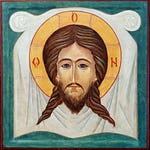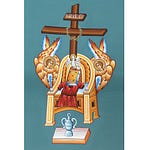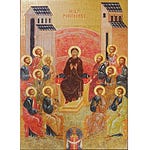[Note: the audio recording above will vary in places from the prepared text below.]
Last Sunday I offered up a reading of the Parable of the Sower in which the various surfaces upon which seed was sowed were interpreted as four different kinds of parishes, or more specifically, four kinds of commitments a parish can have. I spoke of path parishes, rocky ground parishes, thorn parishes, and good soil parishes. As I explained last week, the basis for this way of thinking can be found for example in Isaiah 29, in which the Lord speaks and says, “This people honors me with their lips, but their heart is far from me.” So, one heart for all the people; one heart for many souls, understood together; or, in short, one heart for a parish. Another example is that “Israel” refers to both one man (Jacob, renamed by an Angel to Israel) as well as to a whole nation at once. We are, in S. Paul’s words, one body.
Where this all got to in my preaching was this, taken from my conclusion: “Let us ask God for His help to do the work He wants us to do: work that bears fruit. Let us ask God to assist this parish to be good soil. Let us ask God to turn the presence of the Holy Spirit in our parish into His power in us, and through us into the world. Let us ask God to help us be the good soil that hears the Word and understands it. Let us be the good soil which bears spiritual fruit – thirtyfold, sixtyfold, a hundredfold. Let us continually ask God to bestow upon our parish church of Saint Paul the manifold gifts of the Holy Spirit, that our heart being illumined by Christ’s truth, and our mind purified by Christ’s presence, this parish may day by day be strengthened with the power of the Holy Spirit inwardly in our souls.”
Let me emphasize that I very much believe this parish to be good soil. I believe God called me and my family to this parish in part for that reason. I also think every good soil parish – ours or any other – must have constant vigilance to prevent falling back into a thorn parish; which, as I defined last Sunday is usually an older parish, that despite its commitment to Jesus Christ the Eternal Word of God, does tend to give disproportionate emphasis in the parish to finances and being not too far away from the norms of regular society, such as being too close to a Christian social club. Every good soil parish faces these sorts of temptations, so constant vigilance on the part of the Rector and ministerial leaders of the church are required, so that the soil of the parish remains a bed for deepening spirituality on the part of the church members, that such a parish always is focused on God, and seeks deeper relationship with Him through the Holy Spirit.
All of this carries forth into our Lord’s parable today, in which the kingdom of heaven is compared to a man (that is, Jesus Christ) who sows good seeds (that is, sons of the Kingdom) in His field, but while the men were sleeping (that is, not having constant vigilance) the Devil sowed weeds in the field. Again I want us to consider this from the perspective of parishes, and thus let us interpret “wheat” as orthodox parishes, and the weeds sown by the Devil as heterodox parishes (in which “orthodox” means right belief and right worship in doctrine and life; and “heterodox” means parish’s theology, doctrine, and values being at odds with, and often quite different from, historical Christian witness held everywhere and in all places).
And here is where I will say that my sermon might get spicy. For those who pay attention even to the Episcopal Church, as well as the Church of England, it is not hard to see the battles about doctrine that have been raging in the Anglican world for the last fifty or sixty years: battles about the doctrine of Holy Orders, of Matrimony, of human sexuality, of the nature of when human life begins, and of late, intersections of sexuality and ideas about gender. Speaking as one of the Episcopal priests who is decidedly orthodox on all those issues (and I am hardly a lone voice, I am happy to say), we very much look at the Anglican world and see the Anglican field of Christ’s sowing to be one mixed with wheat and weeds: that is, wheat parishes and weed parishes. Why the Anglican field has been so vulnerable to the devil and his weedy seed is a very good question, but one to reflect upon another time. I will say that in seminary we often heard professors say, about the Anglican world, “We are living in tension,” that is, the tension between wheat and weed, between orthodoxy and heterodoxy, and while it grew tiresome to hear so often, it does speak to our current situation decently well.
The question therefore that servants ask the Sower is one topical for orthodox Anglicans: “Do you want us to go and gather the weeds?” And Our Lord’s answer is: “No; lest in gathering the weeds you root up the wheat with them.” The wheat and the weeds are too bound up together for it to be prudent to try to separate them too soon. Christ says, leave it to the reapers, meaning the angels, who will gather up the weeds at the end of the age. Put another way, Jesus is saying: what is of God, will endure; what is not of God will not endure. Parishes that are wheat and in good soil** [see note below] such parishes are truly of God, and will endure because God is empowering its every breath.
Let us, dear brothers and sisters, be chastened by our Lord’s teaching that parishes that are heterodox in their life, and who do not turn their ship around (which can sometimes happen!), so to speak, will endure weeping and gnashing their teeth, in Christ’s words (and it sounds much worse than that, even). Let us be chastened in our constant vigilance to stay in all things Holy Spirit-centered, Christ-centered, and Almighty Father-centered — rooted, to quote from the Epistle of S. Jude, to the faith once for all delivered to the Saints. Let us hold fast to our orthodox foundation amid the mixed field of the Anglican world. Let us here at the Church of Saint Paul in New Smyrna Beach, be an example to the Anglican world of robust Christian life, that through our obedience, commitment, and focus on Jesus Christ, the Holy Spirit might use our parish as a light to other parishes, and encouragement to them to be strong and faithful: to be wheat ever shining like the sun in the Kingdom of the Father. Amen.
** “Wheat in good soil” summarizes the following characteristics and habits happening in the totality of a parish: God-centered, orthodox in theology, a prayerful community of intercessory prayer, prayer with Psalms and Scripture, regular examination of conscience to detect sinful patterns of life, a robust devotion to the Saints and their witness to Jesus Christ in their lives, a parish able to sit quietly and focus on Christ, and prayer through the full liturgy of the Church, both Mass and Office: a parish in which the Holy Spirit lives and moves and has His being.











Share this post